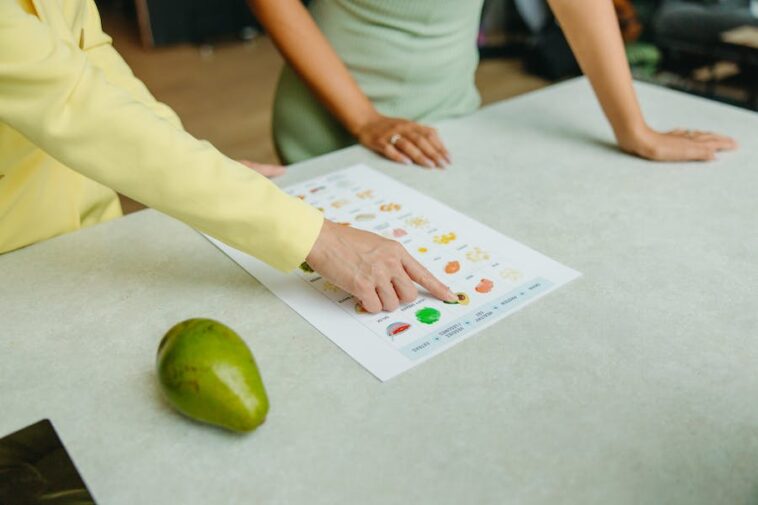Good vision, an integral part of overall well-being, is significantly influenced by our diet. The right nutrients can protect against age-related issues, reduce the risk of chronic eye diseases, and sharpen vision. Understanding the connection between food and eye health is essential.
The Power of Vitamins and Antioxidants
Vitamins A, C, and E, along with antioxidants, play a crucial role in eye health. Vitamin A is key for maintaining the cornea and aiding in low-light vision. Found in carrots, sweet potatoes, and leafy greens, it’s essential for preventing night blindness and dry eyes. Vitamin C, beyond its immune-boosting properties, supports healthy blood vessels in the eyes and can be found in abundance in citrus fruits, bell peppers, and broccoli. Vitamin E, a potent antioxidant, protects the cells in the eyes from damage caused by free radicals. Sources like nuts, seeds, and green leafy vegetables are rich in Vitamin E and are crucial for combating age-related eye damage.
Omega-3 Fatty Acids: Essential for Eye Health
Omega-3 fatty acids, particularly DHA and EPA, are critical for eye health. DHA is a major structural component of the retina, and its deficiency can lead to vision problems. Rich sources of DHA include fish like salmon, mackerel, and sardines. EPA, known for its anti-inflammatory effects, can alleviate symptoms of dry eyes and is found in oily fish and flaxseeds. Including these in your diet ensures the retina’s health and functionality, particularly vital as one ages.

Lutein and Zeaxanthin: The Eye Protectors
Lutein and zeaxanthin, carotenoids located in the retina, act as natural protectors against harmful light. These nutrients are found in high concentrations in green leafy vegetables, eggs, and corn. They help shield the eyes from damaging light rays and are essential in maintaining long-term eye health, particularly in preventing macular degeneration, a leading cause of blindness in older adults.
Zinc: The Vision Supporter
Zinc plays a vital role in transporting Vitamin A from the liver to the retina, essential for creating melanin, a protective pigment in the eyes. Rich sources of zinc include oysters, meat, poultry, beans, nuts, and whole grains. Adequate zinc intake is crucial for preventing issues like night blindness and maintaining the overall health of the retina.
Incorporating Eye-Friendly Foods into Your Diet
Creating a diet that supports eye health doesn’t have to be complicated. Focus on including a variety of colorful fruits and vegetables, as they are packed with essential vitamins and antioxidants. Adding nuts and seeds to your diet provides healthy fats and Vitamin E, while oily fish are a great source of Omega-3 fatty acids. Hydration is also key; adequate water intake is essential for maintaining the overall health of the eye and can prevent dry eye syndrome.
Understanding the Impact of Diet on Eye Health
A diet deficient in these essential nutrients can lead to several eye conditions. For example, a lack of Vitamin A can cause night blindness, while insufficient Omega-3 fatty acids might lead to dry eye syndrome. Conversely, a diet rich in these nutrients can not only prevent but also potentially reverse some of these conditions.
The Role of a Balanced Diet in Preventing Eye Conditions
Eating a balanced diet is not just about preventing deficiencies; it can also play a significant role in delaying or preventing age-related eye conditions like cataracts and macular degeneration. Foods rich in antioxidants can help to protect the eyes from oxidative stress, which is a key factor in the development of these conditions.
Navigating Dietary Supplements
While getting these nutrients from food sources is ideal, dietary supplements can be beneficial, especially if your diet lacks certain foods. However, it’s crucial to consult with a healthcare professional before starting any supplement regimen, as some supplements can interact with medications or might not be necessary based on your current diet.
Avoiding Harmful Foods
Just as some foods can benefit eye health, others can be detrimental. Diets high in saturated fats and sugars can lead to obesity, which increases the risk of developing diabetes and diabetic retinopathy, a leading cause of blindness. Processed foods and those high in sodium can also adversely affect eye health.
Eye Health for All Ages
Maintaining eye health through diet is essential for all ages. For children, a diet rich in fruits, vegetables, and Omega-3 fatty acids supports healthy vision development. For adults, especially seniors, focusing on nutrient-rich foods can help maintain eye health and prevent age-related degenerative diseases.
Simple and Effective Ways to Integrate Eye-Healthy Foods into Daily Life
Incorporating foods that benefit your eyes into your daily diet can be both simple and enjoyable. The key is to make small, sustainable changes that align with your lifestyle. Start by adding a serving of leafy greens like spinach or kale to your meals; they can easily be incorporated into salads, smoothies, or as a side dish. Snack on nuts and seeds, which are not only great sources of Vitamin E but also make for a satisfying, healthy snack.
For those who enjoy cooking, experimenting with fish recipes can be a delightful way to include Omega-3 fatty acids in your diet. Grilled salmon or tuna salads are both nutritious and delicious options. If fish isn’t to your liking, consider flaxseeds or chia seeds, which can be sprinkled over yogurt or oatmeal.
Hydration is another simple yet crucial aspect. Keeping a water bottle handy throughout the day ensures you stay hydrated, benefiting your overall eye health. Lastly, remember that incorporating these foods into your diet should be enjoyable. Trying new recipes, exploring different fruits and vegetables, and even indulging in the occasional creative snack can make this journey not only beneficial for your eyes but also a delightful exploration of flavors and nutrition.
While focusing on a nutrient-rich diet is essential for eye health, it’s equally important to address other aspects, such as proper eyewear. In today’s digital age, purchasing glasses online has become a convenient option for many. After ensuring your diet is supporting your eye health, the next step could be exploring glasses online to find the perfect pair that suits your vision needs. This seamless integration of a healthy diet and the right eyewear, easily accessible online, can significantly contribute to maintaining long-term eye health and clear vision.
A Lifelong Commitment to Vision Health
In summary, your dietary choices have a profound impact on your eye health. A diet rich in specific nutrients can ward off age-related vision problems, protect against eye diseases, and maintain overall eye function. By incorporating a variety of nutrient-rich foods, staying hydrated, and being mindful of harmful dietary choices, you can significantly contribute to the health and longevity of your vision.





